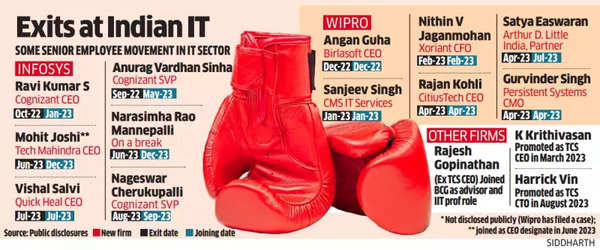Big fight! How Indian IT firms Wipro, Infosys are looking to prevent rivals from poaching talent
According to an ET report, the lawsuits allege violations of employment contracts and other clauses. Infosys, the country’s second-largest IT services firm, has also accused Cognizant of using unethical poaching tactics after several of its executives left to join the rival company, the report said.
Experts in the field of law and recruitment view these responses as an attempt to set a precedent and deter employees from leaving for peer firms. Non-compete employment contracts are generally not enforceable in India, making it important for companies to establish a strong stance on talent retention, experts believe.K Sudarshan, Managing Director of executive search firm EMA Partners India, said that companies are anticipating further exits and want to set an example.
The specific arguments made by Wipro in its lawsuit against Jatin Dalal remain unclear. The next hearing is scheduled for January 3, a source with direct knowledge informed the financial daily.

Exits at Indian IT
Sudarshan suggests that Wipro’s actions could be a calculated response. While Indian courts have generally taken a lenient view on employees in such cases, executives could face unfavorable outcomes if violations of confidential information or data breach can be proven.
When approached for comment, Wipro, Infosys, and Cognizant declined to provide a statement.
Over the past year, both Infosys and Wipro have lost more than 15 senior-level executives to rival companies. Notably, former Infosys presidents Mohit Joshi and Ravi Kumar S have joined Tech Mahindra and Cognizant as CEOs. Cognizant, in particular, has been actively hiring executives from Infosys and Wipro.
Recently, Wipro lost its CFO Jatin Dalal and its chief growth officer Stephanie Trautman, leading the company to dissolve its large deals growth office.
Read From ET |Indian IT firms fight
These developments come at a challenging time for the Indian IT industry, which is facing growth pressure due to subdued technology spends, geopolitical uncertainties, global economic conditions, and the impact of artificial intelligence (AI) disruption. The industry is expected to experience one of its slowest business expansions in the year ending March 2024.





